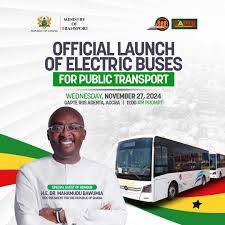Ghana Launches Electric Bus Pilot Program in Accra. A Bold Step Toward Sustainable Transportation
In a landmark move toward environmental sustainability and modernized public transportation, Ghana’s Vice President, Dr. Mahamudu Bawumia, unveiled an electric bus pilot program in Accra on November 27, 2024. This initiative is a critical component of Ghana's long-term strategy to reduce carbon emissions, improve urban mobility, and align with global green energy standards.
A Vision for Cleaner Cities
The pilot program represents Ghana’s commitment to tackling climate change through innovative technology and sustainable infrastructure. Dr. Bawumia emphasized the government’s resolve to transition from fossil-fueled public transport systems to cleaner alternatives, noting the adverse environmental and health impacts of current systems. With rising urban populations and increased vehicle emissions in cities like Accra, this program is seen as a timely and necessary intervention.
“We are taking the first steps toward a greener Ghana. This pilot initiative will not only help reduce our dependence on fossil fuels but also offer an opportunity to create sustainable cities for future generations,†Dr. Bawumia stated during the launch event.
How the Pilot Program Will Operate
The pilot project, set to commence operations in early 2025, involves the deployment of state-of-the-art electric buses on select routes in Accra. The buses will feature zero-emission technology, offering a cleaner and quieter commuting experience. Charging stations powered by renewable energy will also be installed at strategic locations in the city to ensure operational efficiency.
To ensure the program's success, the government is partnering with international manufacturers and local stakeholders. The initiative aims to assess the feasibility of scaling up electric buses nationwide and evaluating their economic, environmental, and operational impact.
Economic and Environmental Benefits
Transitioning to electric buses is expected to deliver numerous benefits. On the environmental front, these buses will significantly reduce greenhouse gas emissions and improve air quality in urban areas, thereby addressing pollution-related health concerns. Economically, the initiative could lower fuel costs and maintenance expenses associated with diesel-powered buses.
Moreover, the introduction of electric buses may create job opportunities in areas such as vehicle assembly, maintenance, and the development of supporting infrastructure like charging stations. Dr. Bawumia highlighted this potential during his remarks, stating, “This is not just about cleaner air; it’s about creating new industries and opportunities for our people.â€
Overcoming Challenges
Despite its promise, the program faces potential hurdles. The high initial costs of electric buses and their infrastructure could pose challenges for widespread adoption. Additionally, Ghana's current energy mix, which relies partly on non-renewable sources, raises questions about the program's overall environmental sustainability if renewable energy use is not prioritized.
The government has acknowledged these challenges and is exploring ways to mitigate them. Collaborations with private sector stakeholders and international donors are expected to address funding gaps, while investments in renewable energy infrastructure will ensure that the program contributes meaningfully to reducing carbon emissions.
Aligning with Global Trends
Ghana’s electric bus initiative aligns with global trends, as countries worldwide are adopting electric vehicles (EVs) to combat climate change. The pilot program places Ghana among the ranks of forward-thinking nations in Africa, like Kenya and South Africa, which have already made significant strides in EV adoption.
International organizations have lauded Ghana’s efforts, recognizing the electric bus program as a step in the right direction for sustainable urban development. The move also complements other ongoing green energy initiatives in the country, such as solar energy projects and afforestation programs.
A Green Future for Ghana
The launch of the electric bus pilot program marks a significant milestone in Ghana’s journey toward sustainable development. If successful, it has the potential to revolutionize the country’s public transportation system, making it not only environmentally friendly but also more efficient and cost-effective.
As Ghana takes its first steps into the electric vehicle era, the program signals a broader commitment to addressing climate change and fostering innovation. For many citizens, this initiative represents hope for a cleaner, greener future—one where transportation no longer compromises the environment or public health.




No comments yet
Be the first to share your thoughts!